Get notified when any new episodes of TheSEOFreelancer podcast go live
Introducing Craig Harkins
In this month’s SEO Freelancer podcast, Nick LeRoy talks with Craig Harkins. Craig leads both the SEO and Content teams at Apartments.com. Nick and Craig talk about having a product mindset and how it can help you as a freelancer deliver more value.
Craig has been in the digital marketing industry since the late 90s. While currently optimizing millions of pages on apartments.com, Craig has worked in-house for both large and small websites.
Craig further shares his experience hiring both agencies and freelance SEOs. He also provides tips on how freelancers (or agencies) can provide maximum value within an enterprise business.
How to connect with Craig online:
Apartments.com - https://www.apartments.com
LinkedIn: https://www.linkedin.com/in/craigharkins
Twitter: https://twitter.com/craigharkins
Resources Mentioned
The SEO MBA by Tom Critchlow (check out my podcast episode with Tom here)
This Months Sponsor: Sitebulb.com
Sitebulb has just launched their latest innovation, ‘Sitebulb Server’, which is like a hybrid crawler - combining the best things about desktop crawlers with the best things about cloud crawlers!
Essentially, it gives you access to your very own dedicated cloud crawler - a cloud crawler that does not restrict your crawling with project limits or crawl credits.
Your entire team can access Sitebulb Server, which means they can all work from the same crawl data in real time. Audit data and reports are all available 24/7 and accessible from anywhere, so data is always ready when you need it.
It’s perfect for remote teams and agencies that need to collaborate on audit data or anyone that needs to regularly crawl really big websites.
If you want to learn more about Sitebulb Server, you can check out demo video on YouTube, or if you want to have a chat about it, book a call with Patrick (Sitebulb co-founder) today!
If you are a freelancer interested in joining me on a future episode of The SEO Freelancer podcast Please email me directly at nick@nickleroy.com
Podcast Transcription
Nick LeRoy
Welcome to the SEO Freelancer podcast. I'm your host, Nick LeRoy. Today I sit down and speak with Craig Harkins, who leads the SEO and content team at apartments.com.
Before we start this podcast, I want to say a quick thank you to this month's sponsor sitebulb.com. I want to highlight that Sitebulb is one of two crawlers that I rely on nearly daily. Specifically, I like to use Sitebulb for my SEO audit deliverables, I find that the user interface is incredibly valuable for taking quick snapshots and being able to provide narratives as to why specific technical issues exist, and what the issue is. And I tend to plop those right into my audits and then provide additional context in the report itself. It's a tool that I rely on regularly and is well worth the price.
If you have a very large website, Sitebulb has actually just come out with sitebulb server, which is a server based solution that will allow you to crawl millions of pages. If you want to give sitebulb a try. Go to their website www.sitebulb.com and if you happen to be a subscriber to my newsletter, the SEO for lunch, go check that out, as well as I'm currently giving away two free annual subscriptions to those that are not only subscribers but pass on to additional members as well. Those details can be in the weekly newsletter, SEOforlunch.com. Thank you again to our sponsor. And let's jump into this conversation with Craig.
Hey, Craig, how are you doing?
Craig Harkins
I'm doing great today, Nick, how are you?
Nick LeRoy
I'm doing fantastic. For those that don't know, you, can you give us a little bit of a background? You know, obviously, I had already jumped the bag that you worked apartments.com And that we used to work together but give us a little bit more information. Yeah, so I, I've been through the long and winding road of working for a company a startup back to myself. And then back to larger companies where I could play in the enterprise SEO space. So the last 10 years have really been on enterprise SEO, building out a local SEO and enterprise SEO strategies and working with dev teams. Fantastic. And as Greg had mentioned, you know, one of his skill sets is working at the enterprise level, as well as hiring and working with freelancers.
Nick LeRoy
So I invited Craig to the show today because we want to have a conversation about how you can deliver SEO value as a freelancer, with a product mindset for both small and large companies. But again, as I mentioned, you know, Craig and I had worked together for a little while. And you know, Craig just has a great perspective on what to look for in hiring freelancers that can support such a large-scale website, as well as what it takes, you know, Craig himself being a leader on the team, but also with freelancing experience himself of what it takes to succeed.
So Craig, thank you again, for joining us. I'm very excited just to have this conversation.
Craig Harkins
Yeah, I think it's a good conversation to have. Yeah, something that I find when I've done freelance work in the past and with, like you said, hiring and working with a freelancers and agencies is understanding what is going to help the client the best and how to position that. You know, sometimes as SEOs, we can talk too deep into the technical and jump right into the weeds. And we leave our clients like wondering about the context and trying to figure out how it fits into their business strategy and what they've got prioritized for the next, you know, 369 months. And so the more we can come back and give that 10,000 foot level or that overview of, of why things matter and how it fits in the, you know, the better the recommendations are going to be. And the easier it's going to be to then see your recommendations actually get through the process and see the light of day.
Nick LeRoy
Absolutely. And I know we're going to go into this a little bit later. But the idea of, you know, if we look at this as client Freelancer relationship, how do I help you advocate for the SEO changes? I think this is the part of freelancing and like He said, even an agency relationship that is not talked about enough. We all assume that it's audits and massive recommendations and, you know, lines and lines of code to change. But before we even get to that point, you have to get buy in, which is communicating that only to your point of contact, but to leadership and sometimes even boards of advisers of why we should allocate resources and budgets.
Nick LeRoy
So Craig, to jump right into all this goodness, without having a quick conversation about your SEO career. I know you had talked about touching on each side of the industry. I know you've been doing SEO since I believe, was it the 90s? When you started
Craig Harkins
Well, I worked for an internet startup, oh, they were one of the first independent internet service providers. And we had a web hosting product. And so I was managing that web hosting product and sales and marketing around it and said, Okay, why would a small business want a website, and then great, they want a website, they can expand a business, etc. This is still the early days of the internet. So then we had to also educate those customers on Okay, now you've got a website, how do you get someone to find it and see that so that you can generate business from it. So it's not just like, a waste, you know, so it's not a it's a real site, not just a hobby site. And so I actually put together a training guide on how to get search traffic for our customers, and then took that and did more with SEO, overall, you know, building out my own website, etc, for a while. And, you know, use that to level up each step of the way through my career.
Nick LeRoy
And I love that I think a lot of people kind of forget, I mean, even in the 90s, as before, I had started, but this was prior to Google, like you said, this is just trying to get visibility, once you have something live, how do we get people to find it? Yeah, you know, I feel like it's a whole chapter of, I guess, whether it's Search Engine Optimization, or I don't even know what to call like, awareness optimization, but it's fun to talk to individuals is yourself that kind of progressed as the internet. Yeah, I have progressed.
Craig Harkins
Oh, yeah, it's had massive changes. You know, now we're 100% on Google. But there were a lot of different sites we looked at back then. But it was like Yahoo directory. was a thing in the day before you had too many pages. And it's like, oh, wait, just like, a big page of links is not going to cut it for users anymore. You know, I do
Nick LeRoy
still to this day, you're gonna spit out your copy out your jacket now. But I still kind of missed the Yahoo Site Explorer, when we used to use that as like our scores for inbound links for every site. You know, I thought when that tool was gonna die, you know that SEO was nearly dead. But I know, I'm certainly dating myself at this point. So it clicked one question, I like to ask everybody, when it comes to the first job, because there's been enough space for both of us, but you know, here you are, you're helping a company, you know, build out some of these websites and marketing them. Do you mind sharing what you were paid back then?
Craig Harkins
Oh, gosh, this is probably going to date myself even more, what starting salaries were but you know, my first my first role is actually in sales and kind of inbound sales. And that was in the, you know, that was making the mid 20s. Sir, which is a little bit low, but it was startup environment. And then it kind of went up from there as the company got bigger, and I was able to move from sales to marketing to product management.
Nick LeRoy
Absolutely. And, Craig, I think you probably have heard quite a bit of people talk about SEO can even kind of exist on both sides. There's the marketing side, and then there's more of the product side. In your experience. Have you worked on kind of both sides of those? And if so, would you say you I know a lot of people like Eli Schwartz will say the money is on the product side. Just kind of curious, from your perspective, if you could chase one of those silos, Which way would you go for an SEO career?
Craig Harkins
Oh, my God, I love being on the product side. I've been so I've been in both on enterprise level. And I will say being on the marketing side, you have more, you've got some more control over the ongoing content strategy and what topics you're going to write about. On the product side. You've got influence you have more influence into the site structure, page code templates, how the CMS how your content works with the content management system that your site has. So for me, the product side is great because I look at I want to make a change that impacts 10,000 pages, not build one page at a time. But that's because I'm, I'm in a mark, I work for a marketplace. Before that I worked for a brand. I worked for hotel brand. So we had multiple locations. And so you were trying to do things at scale. If I'm something like, if I'm on a publishing side, then maybe the marketing side makes more sense, because you're, you know, layering the topic strategy and building the content there. So I'd say I like the tweaking and the technical piece of content. And so product is is a great fit for me.
Nick LeRoy
I think that's probably why you and I have always gotten along so well, you know, as Craig mentioned, being a part of apartments.com. And there's millions of pages, there's no situation and Craig, correct me if I'm wrong, where you're coming in and trying to optimize one single page, because that only moves the needle so much, we're looking for rules and you know, dynamic values to change so that you can make changes across all million plus pages. Yes. It's the only way to do it. And those that are listening that work with enterprise level brands are nodding their head, and some people that maybe work with some smaller sites, you're probably, you know, shuttering at the idea of so many pages, but I promise it's not nearly as crazy as it sounds, it's just more of a mindset you have to adopt.
Craig Harkins
Yeah, and the other thing, too, is the impact and value to the business that you can show on on that side is huge. Like one of my, one of my directs, when he started out, he was going through like looking through the site found an issue with some internal links were breaking. And we were able to track that root cause that back to Oh, this one data system was giving us the wrong URL back. And so instead of going in and fixing one at a time, these links, were able to put through a code patch and it fixed 10,000 right away. And so that we were able to get to the root cause hit that and how it was affecting all of our templates, and so that, that type of impact. And especially when you're launching, you know, you're figuring out a way to target content that applies to multiple locations that you're operating in, you can make one change and have massive impact.
Nick LeRoy
And just to kind of build off of that. And I think that's why I love the enterprise world so much is like you said it can be what is kind of considered from an SEO perspective, a small tactic as in fixing broken links. However, in this instance, if you are a website that's generating millions of visits and making millions of dollars, imagine what an 1% increase across the entire site does not only for your bottom line, but for your organic traffic as well.
Craig Harkins
Yes, and that's what makes the value of a good freelance engagement to an enterprise. Easier to justify, is because if you're going to a small business like hey, this Mom and Pop florist, and you increase their revenues by 1%, that's okay, they can get one more cup of coffee. But you do that for a large marketplace or a large ecommerce site, then, you know, you've paid your contract outright there. So it's it's just kind of the scale you can work out. Now I will say when I've done some I do like when I do some freelance stuff off the side, I'll do some pro bono for some friends and stuff. But I like digging into the local to like the local SEO and the one off, because it's a very different. It's a very different game. And so that kind of keeps the skills fresh to see what's going to work on an individual location or an individual small site versus something large and the scale that I'm working on daily.
Nick LeRoy
Yeah, without a doubt. And Craig, before I move on, I always like to make one analogy. I always think it's significantly harder to take a brand new site from zero to 10,000 visits than it is to take a website that's already taking a million visits and to bring that up to 1,000,000.5. Just For all the reasons that you're saying, Would you agree or disagree?
Craig Harkins
I agree. But getting getting started is the the toughest part. You know, when you're entering a building a new site, or even with an existing site, using it to enter a new space, you're gonna have a ramp up period. And it's really, you've got to do a lot of activity to get that initial traffic flow going before you get all of those signals in place to start getting rewarded.
Nick LeRoy
Without a doubt. Okay, I want to transition a little bit into our big conversation here, just about freelancing, and how it works within kind of an enterprise level company. As I mentioned before, you and I were fortunate enough to be able to work together, I had actually been hired from apartments.com, prior to Craig joining. So all the tips that he's giving on how to assess out, I may or may not have passed, if he interviewed me himself, he kind of got stuck. But Craig, I'd love to hear like, let's just kind of kick up like when you're looking to hire a freelancer or an agency, we'll just kind of label it outside help. What's going through your mind when you are being tasked to increase a site like apartments that calm their organic presence?
Craig Harkins
Yeah. When I'm looking to bring someone bring someone in, I usually have a specific gap that I'm looking at. So when, if, early in early on@apartments.com, we were, we were pretty resource strapped. So we were looking for some more generalized help. So I need someone to I've got 100 things, I'm looking at one another set of eyeballs on this to work with, to help go through some of this backlog and, and figure out some prioritization, because I've got to be in meetings all day. And I still need to spend another eight hours going through tickets and prioritization. And, and I don't have that many hours in the day. And so, you know, that initial started out is very general, and a lot of generic work, where I'm looking for kind of one type of, of SEO or an SEO that can operate on those general like, here are the things that we've got, you know, let's spit ball the prioritization. But then we had the team build had some processes in place. And then then the work pivoted to here are my specific gaps. I have a specific problem I'm trying to solve either with content strategy, or with kind of a content workflow or with a technical analysis for rendering and PageSpeed. So at that point, which is where we are today, is I'm looking at the those different gaps and saying, Okay, I need someone that's just going to focus on this and give me some give me the recommendations so that I can bake that into our roadmap and plan. And so at that point, I kind of vet out look for people in my network, or people adjacent to my network, that I do that type of work. And that I can bring in.
Nick LeRoy
And I think that is critical on both sides. I'll play the role as Freelancer now. And I'm thinking about this when I talk to prospective clients, or I'm pitching myself. And one of the things that I'm commonly doing when talking to someone like Craig is fully realizing that Craig only has 24 hours in his day, he can't squeeze that to be a second more or second less. So the ability of value add is what he's saying. It's like, how does he literally extend himself? So how do I position myself as an extension of him to help get all the things done, that he needs done in that amount of time? So I think with that, Craig, so when you're finding that person, and especially like you said, Maybe it's easier when you're looking for more about generalists, that's supporting you on everything in anything, but when things get a little bit more specific, you know, no, one, the technical side or the editorial side? How do you go about finding these contractors or an agency? Do you have a process that you typically are using? Do you like to use like your HR team and vet through interviewing, like, walk us through that a little bit?
Craig Harkins
So HR team, I'm gonna use more for, you know, when we're doing when we're hiring a full time employee for freelancing for a freelancer agency. I'm starting with my network. Who do I know that has done this type of work before? This is where building those relationships at conferences and events like play pays dividends down the road. Oh, Um, so talking to the network, finding out if people have capacity to come in and, and give me a, you know, pitch me for a statement of work. Or if they can't, they can refer me to other people because I don't really want to spend the time, say, Hey, I'm looking for a freelancer get a bunch of inquiries, and then have to weed through look through case studies, do detailed interviews, I want a trusted friend in the space to recommend someone to me, because then that that's like, half the work is done for me. Because, you know, the people in my network will pre screen that for me. So I'm not going to get bad recommendations from from my direct contacts. And then it's really going through, not so much of a prove to me you know what you're doing. But it's a conversation around, hey, here's the problem I have. This is the type of recommendation I'm looking for. This is the deliverable I want. And then we have a discussion on, you know what, so you and I would have a discussion on what you could provide or how you see that deliverable shaping up? And what kind of time commitment you think it would be like how many hours a week you would need, in order to meet the deliverables that I've got. And then we would go from there.
Nick LeRoy
Yeah, and I absolutely love hearing that. It's network based, I think, especially for large companies like apartments.com, we hear so many stories on the agency or freelance side that you have to go through these crazy RFPs. And it's going to be, you know, Flying Cross Country to sit in front of a board of people, when in reality, like you said, they just need one person to have a good recommendation to get you in the door. And I will share a fun story, Craig, hopefully you don't mind this. But I had been brought in before Craig worked out apartments. And he because we had been connected before, actually called me to kind of say, Hey, this is the gig that I think I'm taking, I'm really excited. But I want to see what you think like you've been working with them for a while. So it was a way for him to actually use his network who coincidentally was freelancing for the company that they were desperately looking to bring in someone of his caliber. But we were able to leverage our, you know, friendship, to be able to talk about it. I think both of us hung up the phone, and we're pretty darn excited that we were gonna partner for a little while. And then obviously, you know, apartments Ico is in a great position now, because Craig is they're running everything. And they don't need to be as reliant on freelancers.
Craig Harkins
Yeah, that's another. That's a great call out on how else you can use your network for you. Because in the job hunt, and in the job decision, being able to be able to have that back channel on what's it like to work with this company? Do they do they have their stuff together? Or are they going to be the crazy client that is like, well, I know that I told you to do X. But what I really need to see today is why and then your head is spinning on like, Well, wait a minute, what am I working on now? Yeah, I think that's where your network comes into play to you both for helping get you in the door, and also for vetting who you want to work with?
Nick LeRoy
Absolutely, no, I think you and I had a very transparent conversation. And I think both of us from the very beginning, were like, this would be cool. We could really work together. But let's talk about XYZ. You had questions. I had questions. And you know what, and then for a while, you know, there we had a really good opportunity to work together.
Craig Harkins
Yep. Now, I will say that it depends upon each team's budget and how they roll up on for an Enterprise site, how you're going to be able to get things through. So I've worked at another company where there was a pretty extensive process, like you said, on, okay, you want to bring a new person in the door, they've got to go through procurement get set up, and there's a vetting process, etc, etc. And that could take some time and it a lot of that is driven by what is the ultimate expected annual spend? Yeah, so I would say as a freelancer or a small agency coming in the door, when you're having those initial discussions, and you're putting your pitch together, get those guidelines like hey, what, what is the Signing Authority? Where do you what triggers that next review, and then you can scope out your work to me meet those needs now. Maybe they need the large engagement that's going to trigger that review and trigger the extra, you know, the extra processes. And that might be worth it. Or you may say, hey, let's break this up. Let's just give you a phase one and break it in and come in under that trigger point so that you can work off of what, you know, you're essentially hiring managers Signing Authority is, and that's going to differ from enterprise to enterprise, and even from year to year within the same enterprise.
Nick LeRoy
Yeah, so two notes on that one Cregg. You may not even know this. But that's actually how I got into apartments. I was signed, and went through procurement to do a one off project. And only at that point, when I was in the system went through procurement. Could we have larger conversations about ongoing but it was because it was already vetted. And, you know, services were rendered valuable. Yep. The other thing I will say to Craig is, you know, most people listening to this podcast are probably shuttering. As soon as you say the word procurement, it might as well be the F bomb. On the side, a good procurement team is amazing. But a bad procurement team is even worse, I will say apartment's procurement team is not bad, not in my experience, at least. But I've worked with some doozies with other companies.
Craig Harkins
It's it's all it all rolls back to what what their incentives are? I know some that, you know, they're, they're kind of I think apartments is more service based where they really want to help enable the business. There have been other other companies where it's kind of a, how do we keep the number of contracts low? Sure. And yeah, whoever you're talking to at the company, should have a feel for the process, and how to navigate that. And that's a sign that you kind of want to see to you, you want to see that the person you're going to be working for can can get through those gates pretty easily for you.
Nick LeRoy
And without sounding like an advertising, there is quite a bit of this talked about in the book called The million dollar consultant, where they talk about making sure that your point of contact is someone that has the power, the ability to quote unquote, sign or bring something directly to procurement, as Craig is saying, versus and Craig, you probably even have situations where you have people on your team, they're they're allocated, you know, decision makers, but only up to a certain point. And then you know, they need to go somewhere else. So it's important to know who you're working with. Right. So with that, I think that is absolute Golden. Thank you, Craig, for giving us that perspective, especially at the enterprise level, where I think things are a little bit more of a mystery box than some other companies. But more importantly, so we've already talked about how you are identifying the freelancers or agencies that you want to work with, how you kind of vet them out a little bit, you know, and then what kind of that interview looks like? And heck, we even talked a little bit about procurement and how you get a contract. But now let's assume all that goes through. We're working together. And now I want to understand how do big companies leverage freelancers? And how what tips can you give these freelancers to help them best support you or any other enterprise level company?
Craig Harkins
Yeah, I would say anytime that a company is bringing on either a freelancer or agency support, it's really to flex their headcount in a way that is that is more agile. So in order to get a if I have a need for SEO, and I need, my current team is overloaded, and I've got a need either for some specific expertise, or just more hours to get things done. It's going to take me months to hire that and bring in a new full time employee, it's going to be a much faster process to bring that bring that Freelancer in to supplement the work. And so, you know, as a freelancer, you're an you're an extension of the team's headcount to get things done. And so that's, you know, the big value is being able to come in and quickly get to work and start delivering. I know there in some companies, like some companies are philosophically much more aligned to if we have a need, we're going to hire for it. Other companies are very philosophically around. We're going to, we want maximum flexibility. So we're going to bring in freelancers to do all our work because we know that there are seasonal ups and downs and we Want to manage to the seasonality? And just kind of know which kind of company you're working for on? Is this going to be kind of an extended contract? Or is this going to be three months and out? When you're coming in? But does that answer what you were looking for there?
Nick LeRoy
Yeah, absolutely. I think, you know, that definitely helps. Just that mindset of how a freelancer can come in. Because I think to your point, especially with a large company, it's much about, I guess, there's two different roles, and we kind of played both of them together for the time we work together. One is just feet on ground, we need more people to work on everything, so things can get done. And then for people that are more senior, you know, I know, Greg, you and I had quite a few strategic conversations. So you already have a vision for your brand for your website. But I know that at your level, you don't always have people outside of your team that you can bounce ideas off the wall. So I know you and I have had some crazy ideas. And I suspect at times, that's where you see value in an agency or freelancers as well.
Craig Harkins
Yeah. And, and it's kind of the joke that we always said, working in a product management organization, we would joke around either, you know, one of the big consulting firms coming in, it's like, all they end up and the joke is, well, all they end up delivering, is a PowerPoint deck. That is the same recommendations you already gave to the VP anyway, you paid a lot of money to be able to get someone else to say, but yeah, it came in for it came in from an external source. So it's not biased, and it's a strategic recommendation. Like I don't use freelancers as much for that. But there is value in that third party validation, and that external validation, and, and also in, running down, you know, all of the external sources for it, that I think is is very helpful when you're, when saved me is someone on the product side and an enterprise, when I'm building that case, to make those SEO changes, and map them into the overall product roadmap of all of the other product features that our needing dev resources. Yeah, that's it's another external validation to help build the case for the SEO for the SEO work.
Nick LeRoy
Yeah, without a doubt. And I think one thing, just add clarity to it's not just necessarily say, for example, Craig and I sitting in a room and bouncing ideas off of each other part of it is, Craig already knows what a lot of these opportunities are. Remember, he's going to be sitting in these meetings with other leadership, you know, being an asset and advocating for it. So if you're coming in, and let's say you're doing a technical SEO audit, you're really arming him with data and recommendations based off of that own websites information. So that's just another way. It's not about just saying, oh, Craig wants to change the title tags across 3 million pages. It's Look, these are broken on this much pages. And since this day, it's dropped, you know, five positions on average, or something along those lines, so you can use your own data to support you, who is advocating for, you know, a shift in strategy. Yeah, sorry. Sorry. Go ahead, Greg. Yeah, I
Craig Harkins
was gonna say we could talk now, I thought we, we talked before offline a little bit around, you know, those those deliverables that the, you know, the Freelancer can bring in and how to deliver that so that it's most useful for someone. And so, I'd say on that. We've seen a lot of, of chatter in the space around, you know, don't just give a, you know, list of here's 100 things wrong with your site. Because then there's, like, one, it's overwhelming, like, what what am I going to deal with this? But she doesn't tell a story. And so working in a product organization, this is a, a bit of coaching I did with an employee before. We had a bunch of tickets. Here are a bunch of individual small things we want to do. And they weren't getting any movement. They weren't getting priorities. They weren't getting prioritized. It was like we've we've got them in the backlog, but Well, this product feature has priority, so we're bumping this ticket to the next sprint. What got traction was we took those tickets, we bucketed them up into a feature to tell the story of if we do this group of things, it all rolls up into one theme. And so that theme becomes a product feature within the product management and Dev organizations. And that has collectively a lot more weight behind it, that you can then get into a sprint and get executed. And you know that I think, as a, you know, for newer freelancers, if you're used to like, having having those tickets, like breaking it out is great. But group them up into themes, so that you can tell the story around why you need to do that collective amount of work. Otherwise, it becomes like changing our oil and or just we call technical debt, things that you know, you need to do, but you'll get around to at some point. And you kind of keep kicking it down the road, because there's not a big theme or story around why you need to do it now.
Nick LeRoy
Yeah, and that is super critical. And I think the one thing that we could layer in there, tell me if you disagree is always keeping in consideration the level of effort versus the level of impact. So like you said, that part of the the narrative. So many times, anyone who's doing an audit, I'm sure Craig does this, too, we have things like image alt text, it's not about whether it's right or wrong, I mean, our best practice as your images should have them. However, Craig will be able to know working through his product team, wow, this is going to take 100 hours for whatever reason, and we suspect the lift to be 1% with an image search. With apartments, maybe that's not the highest priority. So despite it being a best practice, it's not going to be prioritized. Or vice versa. You might have 12 tickets that are gonna require full on Sprint and pointage. But, but you don't always have that point available to you. So you have to kind of, you know, seed them as appropriate. Right. So I think that that is super important. And I think everybody should honestly rewind and listen to what Craig had said before, because this is how you're going to provide the most value as an outside resource, helping an enterprise assign only identifying these opportunities through, say, an audit or even one off analysis. But it's breaking those SEO tickets into different buckets, and helping build narratives. So someone like Craig can go to leadership and get buy in. And again, part of that being what is the level of effort versus what is the potential reward? But I think Craig, would I would love to hear more for you is kind of that last part? How do we as outside resources, help you get buy in? You know, it's like kind of evangelizing for the SEO channel as a whole?
Craig Harkins
Yeah, so a couple of the areas that I find help a lot are one looking at how your client site is doing versus the competitive set. So you could say, like one thing, like PageSpeed, like that's been been the thing like, Can you can you actually one map, differences in Page Speed to any kind of decay in rankings or traffic or click through rates or engagement? But then it's a relative metric? So whether you're fast or slow, yes, you can be meeting correlate vitals are not, but how is that site doing versus their competitors? And, and how much of an appetite does the product team have to win that battle in particular, so being able to help your client in setting some metrics to measure so that once they do launch those recommendations that you have, and they push them live, that you've got something to go back to look at, and provide some more, you know, some more ammunition to your client on hey, we did this change. Here's what we saw, here's how we're now doing compared to the competitive set. And then that becomes part of that part of that internal story on, hey, I win, you know, I as a product manager, I went and got resources to have this thing done. And now we're doing better compare versus our competitors. So that's a story I can sell internally to say, the next time that I get another SEO recommendation and can put it together. It's like, oh, well, the last time Craig had a recommendation, we did it delivered and it was a positive impact. So we're gonna trust this next recommendation. A little bit more because he's already got Got a got a track record, and you build upon those. And really, as a freelancer, maybe you start with those those quick wins, like what's gonna require the least dev effort, the least lobbying to get through so that those bigger, more more audacious ideas can then come later as, as you've built up that trust and credibility?
Nick LeRoy
Yeah, I really, really appreciate that you had mentioned following through, it's not only getting those resources and kind of the checkbox of Yes, we did this SEO recommendation. But being able to track what was the performance gain, because as you had said, the next time you kind of go back to get these resources, when you can use your own data to support that this was a really good use of time and resources, that's going to help you, you know, get those resources again, in a later point. The other thing that I'd love your opinion on and I know we kind of had dealt with it working together is at the enterprise level, I think perfection can sometimes be an enemy. You know, you never want to necessarily go into production with anything. You know, that isn't perfect. But there are some instances where you're working so long, so hard, so fast. 80% Yield is significant improvement. So would you would you agree with that? I mean, obviously, we never want to not have anything be perfect, but there just are situations where, you know, not every recommendation can be met to the tee.
Craig Harkins
Right? And there. There are also some times where you've got to see does it doesn't really matter, like, image, alt text, it does it really, really matter. Now there are there's good accessibility reasons why we're doing work there. Maybe not, as great SEO reasons to do it, to spend a lot of time on it on something that, you know, is going to require a little bit more manual work than automation. And that's where you've got to make kind of your justifications like, like you said, getting 80% of the way there. That might be the win. Like how much how much more effort is that last 20% or 10% going to take versus how much gain you're reasonably going to get from it. And we've had to make that decision. You know, both of them. That's a that's a sprint to sprint decision, like, how much more are we going to push this? Right. And then every enterprise site has, because of the architecture and because of decisions that have been made in the past. Hundreds and hundreds of things wrong with it from a pure, you know, from a pure cleanliness, SEO perspective, especially the older sites, because they've got layers of layers of CSS and JavaScript and old code because they had to support legacy browsers and all this other stuff that you would love to get rid of. But how much time do you spend there?
Nick LeRoy
Exactly, you're always dealing with a finite amount of time and money. You can only have so much,
Craig Harkins
right? And you always have new things to take advantage of. So is there a new search feature? So with what's worth more cleaning up this this code that you would like to clean up? And probably the development team would love to spend some time cleaning that up? Just have a clean codebase? Or do you go after that new search feature? That's going to increase your click through rate?
Nick LeRoy
Exactly.
Craig Harkins
You know, I know what I know what my leadership would want me to do.
Nick LeRoy
But that's a great mindset. And a great reminder for freelancers and outside support. A lot of us tend to work on quote unquote, best practices. And it's a good reminder, it's always about you don't pay the bills with best practices. Yeah, always move the needle.
Craig Harkins
We're we're in SEO, because I'll say why I'm an SEO, I'm an SEO because I want to bridge that experience gap from a user starting a search, trying to figure out the answer to their problem, to delivering that content in front of them so that they can come to my site and have the solution. Every everything else is you know, just tactics to get there. So if one way of getting visibility for the user is going to be the best, you know, the most impactful one I have got in front of me if that's what needs to be prioritized and worked on and then you know, figuring in how do you To clean up everything else that you want to, you just have to prioritize that that's for the product teams to, to figure out. But most large sites have some percentage of time that they allocate to some of that technical cleanup. But you're just not going to do it all at once, you've got to be having a combination of going and acquiring more traffic or improving traffic. And then at the same time, cleaning up some of that technical debt. But you're gonna get it cleaned up faster if it has a direct improvement to the user experience.
Nick LeRoy
1,000% Plus, you know, at the never ending list, we'd like to call that job security sometimes.
Craig Harkins
There's always more to do. Exactly.
Nick LeRoy
So Craig, starting to wrap up, I got two last questions. One, I'd love to understand Do you have any recommendations for aspiring freelancers, or people just looking to get into SEO, you know, specific books, courses, newsletters, or anything along those lines.
Craig Harkins
So I love the SEO MBA. So good online course that, you know, Tom does a great job of giving examples of how you make those business cases. And how you tell that product story. So for me, for people working with me, it's it's a great way because it talks about how to make those recommendations and how to forecast and how to then report back on on impacts after the fact. So I think that's a great one.
Nick LeRoy
And he was a podcast guest, so I'll make sure to link to that podcast.
Craig Harkins
There you go. There you go. I'm helping your internal linking already. Really, a lot of my other stuff that I've been spending time on has been really around relationship building and team building. So I not so much looking at the other Freelancer type of work. But what I also like to do is looking at video replays from different conferences, just hearing how other SEOs talk about the problems and solutions, you can usually pick up some ways that like, Oh, here's another way to explain this. Because I think this is where, where we, as SEOs get into trouble is, we get really excited about the details. And we jump in and we start talking about, you know, the weeds of like, well, there's this canonical tag and, and the rel nofollow and and this reference and the people we're talking to their eyes glaze over. They're like, what does this have to do with my top line ecommerce revenue? So having you listening to the different coffee, you know, different conference talks on how to people explain this same problem and solution in ways that are accessible to a non technical, non technical base? Because then you can try out some of that when you're talking to you're talking to prospective clients or your current partners and see like, hey, does this help explain what we're doing a little bit better? I think anything like that, just to help you be a better communicator is going to make you deliver better as a freelancer.
Nick LeRoy
I would agree with you. Again. 1,000%. Everything that you're saying is nearly exactly what I recommend to people as well. But thanks again for your time, Craig, I really appreciate you joining us today on the SEO freelancer. For those that want to connect with you or get a hold of you what's the best way to get in touch?
Craig Harkins
So I'm on LinkedIn, crack Harkins, easy to find. Also, I'm at crack Harkins on Twitter, and I'm there occasionally not tweeting as much because we're in the baseball season right now. But yeah, those are kind of the two easy ways to find me on social and get in touch with me.
Nick LeRoy
Fantastic. And thank you again, Craig. I really appreciate you joining us and always enjoy our conversations.
Craig Harkins
Awesome. Thanks a lot, Nick.
Nick LeRoy
Thank you. Bye bye.





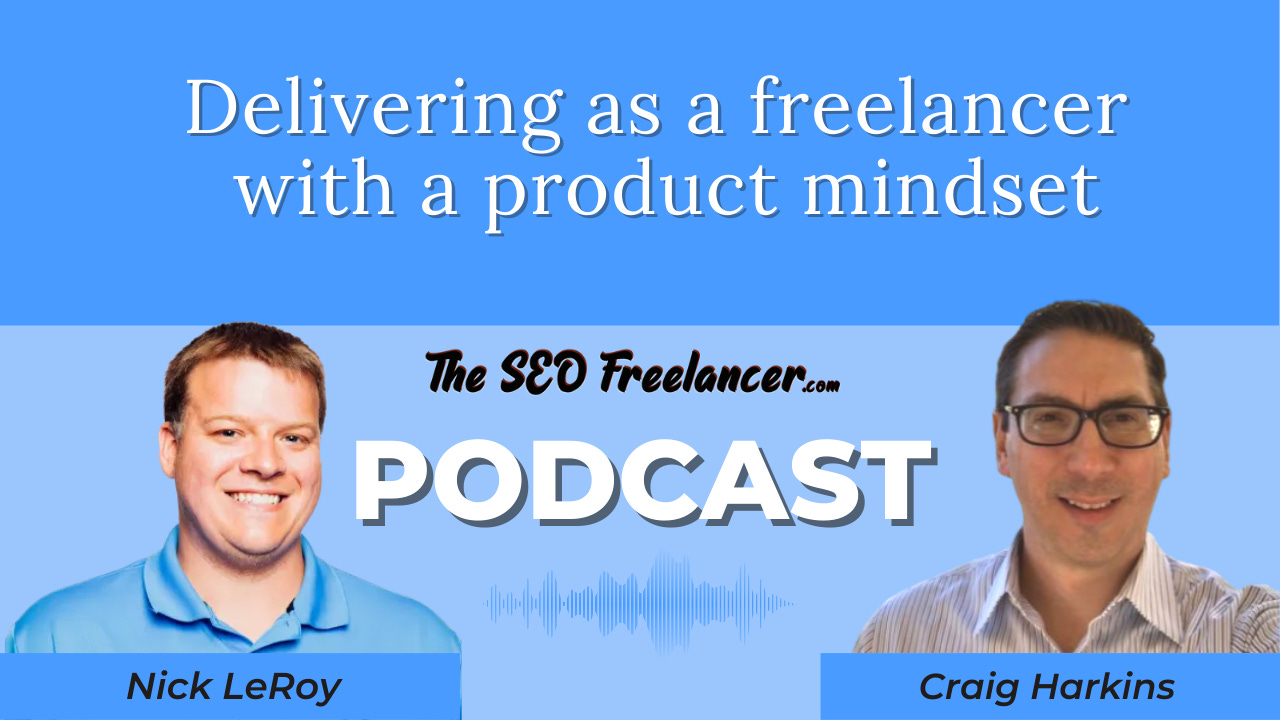
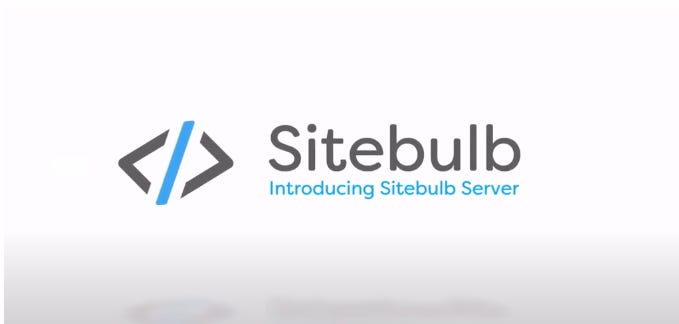


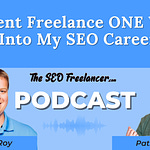
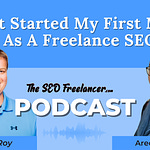
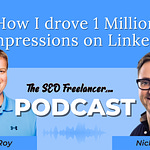
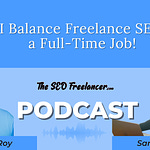

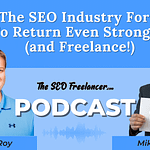
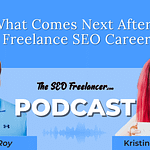
Craig Harkins: How to deliver to teams as a freelancer via a product mindset?